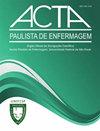Sleep quality assessment in emergency health professionals
IF 1
4区 医学
Q3 NURSING
引用次数: 0
Abstract
Objective To assess emergency service professionals’ sleep quality and its association with the level of fatigue and quality of life. Methods A descriptive, cross-sectional and correlational study, carried out in the units of the Mobile Emergency Care Service (SAMU) and in the Emergency Care Unit (ECU), in 2021, with 108 participants. To assess sleep quality, the Pittsburgh Sleep Quality Index, Brazilian version (PSQI-BR), was used; to assess fatigue, the Chalder Fatigue Scale was used, together with the Need for Recovery Scale (NFR); and to assess quality of life, the World Health Organization Quality of Life Brief Version (WHOQOL-bref) was used, and the instruments used were adapted to Portuguese in previous studies. Association tests were applied for statistical analysis, using Pearson’s chi-square test, Mann-Whitney U test or Kruskal Wallis and Spearman’s correlation. P-values <0.05 were considered significant. Results It was identified that 72.2% of participants had poor sleep quality and 75.9% were fatigued. A significant association was observed between sleep quality and fatigue, the need for recovery and quality of life. Conclusion It was identified that health professionals working in emergency services have poor sleep quality and life, and high levels of fatigue and need for recovery, which can directly impact their personal and professional activities.急诊卫生专业人员的睡眠质量评估
目的了解急救人员的睡眠质量及其与疲劳水平和生活质量的关系。方法一项描述性、横断面和相关性研究,于2021年在流动紧急护理服务(SAMU)和紧急护理单位(ECU)进行,共有108名参与者。为了评估睡眠质量,使用了匹兹堡睡眠质量指数,巴西版(PSQI-BR);采用Chalder疲劳量表和恢复需求量表(NFR)进行疲劳评估;为了评估生活质量,使用了世界卫生组织生活质量简要版(WHOQOL-bref),所使用的工具在以前的研究中已适应葡萄牙语。采用关联检验进行统计分析,采用Pearson卡方检验、Mann-Whitney U检验或Kruskal Wallis和Spearman相关。p值<0.05被认为是显著的。结果72.2%的参与者睡眠质量较差,75.9%的参与者感到疲劳。研究发现,睡眠质量与疲劳、恢复需求和生活质量之间存在显著关联。结论急诊卫生专业人员睡眠质量差,生活质量差,疲劳程度高,需要恢复,直接影响其个人和专业活动。
本文章由计算机程序翻译,如有差异,请以英文原文为准。
求助全文
约1分钟内获得全文
求助全文
来源期刊

Acta Paulista De Enfermagem
NURSING-
CiteScore
1.40
自引率
0.00%
发文量
92
审稿时长
4 weeks
期刊介绍:
Acta Paulista de Enfermagem – (Acta Paul Enferm.), ISSN 1982-0194, is a [bilingual] technical-scientific electronic publication of the Escola Paulista de Enfermagem – EPE, Universidade Federal de São Paulo – UNIFESP.
Our mission: To disseminate the scientific knowledge generated within the rigor of research and ethics methodology.
Our objective: To publish results of original research for advancement of practices of clinical, surgical, and management nursing, as well as education, research, and information and communication technology.
 求助内容:
求助内容: 应助结果提醒方式:
应助结果提醒方式:


